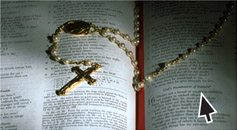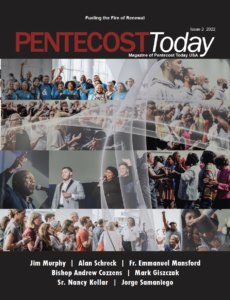Meditation and Questions for Reflection or Group Discussion
Mass Readings:
1st Reading: Sirach 27:30–28:7
Responsorial: Psalm 103:1-4, 9-12
2nd Reading: Romans 14:7-9
Gospel: Matthew 18:21-35
Responding to God’s Boundless Mercy and Love
How often must I forgive? (Matthew 18:21)
In his very first Sunday homily as the Holy Father, Pope Francis proclaimed, “This is the Lord’s most powerful message: mercy” (March 17, 2013). Since that day, he has repeated over and over the marvelous truth that God’s mercy has no bounds. That’s precisely the problem with the heartless servant in today’s Gospel: his mercy had limited, clearly defined boundaries.
How boundless is God’s mercy? The best way to answer that is to consider what our lives would be like without it. Imagine a world with no tenderness, no forgiveness, no compassion. Imagine being bound in your sin and selfishness, your guilt and shame, with no way out. Now imagine God sacrificing himself not only to rescue you, but to offer you the promise of eternal life with him in heaven. That’s how boundless his mercy is. That’s how deeply he loves you.
Struck by the depth of God’s love, how can we do anything but bow down to him in worship and show that same mercy to the people around us?
Mercy is not just an abstract idea or a nice theory. It’s a concrete reality. It’s not just a message that we can choose to live out when it’s convenient for us. God’s mercy for us is meant to be at the heart of how we think and act toward each other. It’s meant to be the characteristic that sets us apart in a world caught up in self-righteousness, division, and unforgiveness. It’s the best way we can reveal God’s love and invite people to taste it themselves.
Peter asked Jesus, “How often must I forgive?” (Matthew 18:21). He was looking for a solid number of times, after which he was off the hook. He was asking about the rules. But for the one who has grasped the depths of God’s mercy, rules and limits no longer matter.
May we all taste this mercy more deeply today so that we can become more merciful as well.
“Thank you, Jesus, for showering me with your love. Lord, help me to be more merciful.
Download this reflection with discussion questions here.
(Many thanks to The Word Among Us for allowing us to use meditations from their monthly devotional magazine. Used with permission. For more information on how to subscribe to their devotional magazine, go to www.wau.org).
Sunday, September 17, 2017
Questions for Reflection or Discussion:
- The words of the first reading could not be clearer, do not hold onto anger against others: “Wrath and anger are hateful things, yet the sinner hugs them tight. The vengeful will suffer the LORD’s vengeance, for he remembers their sins in detail. Forgive your neighbor’s injustice; then when you pray, your own sins will be forgiven. Could anyone nourish anger against another and expect healing from the LORD? Could anyone refuse mercy to another like himself, can he seek pardon for his own sins? If one who is but flesh cherishes wrath, who will forgive his sins? Remember your last days, set enmity aside; remember death and decay, and cease from sin!”
- Why do you think the consequences of holding onto anger and not forgiving others are so severe?
- Why do you believe the first reading also encourages us to remember our “last days” when it comes to letting go of unforgiveness, anger, and vengeance toward others? How are you doing in “setting enmity aside’?
- The responsorial psalm speaks of the Lord’s great mercy, kindness, and compassion towards us: “He pardons all your iniquities, heals all your ills. He redeems your life from destruction, crowns you with kindness and compassion. He will not always chide, nor does he keep his wrath forever. Not according to our sins does he deal with us, nor does he requite us according to our crimes. For as the heavens are high above the earth, so surpassing is his kindness toward those who fear him. As far as the east is from the west, so far has he put our transgressions from us.”
- In what ways are the description of the Lord’s “kindness and compassion” toward us in the responsorial psalm related to the severe warnings against unforgiveness and anger toward others in the first reading?
- How does knowing “The Lord is kind and merciful, slow to anger, and rich in compassion” impact the way you treat others? Since the Lord has so generously pardoned you, are there people in your life to whom you can provide healing and pardoning?
- The second reading provides a powerful description of how to live: “None of us lives for oneself, and no one dies for oneself. For if we live, we live for the Lord, and if we die, we die for the Lord; so then, whether we live or die, we are the Lord’s. For this is why Christ died and came to life, that he might be Lord of both the dead and the living.”
- What is your understanding of the meaning of these words? How can they be a greater reality in your life?
- In what way is this reading related to the need to change our behavior with regard to unforgiveness and anger?
- The Gospel reading tells the familiar parable of the king who forgives his servant of the “huge amount” he owed him, but the servant then refuses to forgive “one of his fellow servants who owed him a much smaller amount.” When the king finds out, serious words and actions follow: “His master summoned him and said to him, ‘You wicked servant! I forgave you your entire debt because you begged me to. Should you not have had pity on your fellow servant, as I had pity on you?’ Then in anger his master handed him over to the torturers until he should pay back the whole debt.” The Gospel reading ends with these challenging words of warning to us: “So will my heavenly Father do to you, unless each of you forgives your brother from your heart.”
- Why do you think the king called his servant a “wicked servant” when he found out how he treated “his fellow servant”?
- Jesus’ parable of the king and wicked servant in the Gospel reading could not be more obvious: we will be forgiven to the same extent we forgive others. We cannot just ask for mercy for ourselves from the Lord, yet demand justice for others. How can knowing this reality impact the way you relate to others?
- The meditation tries to describe what the world and our lives would be like without God’s mercy: “Imagine a world with no tenderness, no forgiveness, no compassion. Imagine being bound in your sin and selfishness, your guilt and shame, with no way out.” It then tries to describe God’s mercy: “Now imagine God sacrificing himself not only to rescue you, but to offer you the promise of eternal life with him in heaven. That’s how boundless his mercy is. That’s how deeply he loves you.” The meditation ends with these words: “May we all taste this mercy more deeply today so that we can become more merciful as well.”
- The meditation describes God’s mercy as “boundless.” What do these words mean to you:
- How would you describe the difference between a world without God’s mercy and a world abounding with it?
- What steps can you take to emulate God’s mercy and “become more merciful as well.”
- Take some time now to pray and thank the Lord for his great love, and ask him to give you the grace to be more merciful to others. Use the prayer below from the end of the meditation as the starting point.
“Thank you, Jesus, for showering me with your love. Lord, help me to be more merciful.”
[The discussion questions were created by Maurice Blumberg, who is in partner relations for The Word Among Us Partners, (http://www.waupartners.org/); a ministry of The Word Among Us (www.wau.org) to the military, prisoners, women with crisis pregnancies or who have had abortions, and college students. He is also a member of the National Service Committee Council of the Catholic Charismatic Renewal (https://www.nsc-chariscenter.org/) and a member of the board of directors of the Christlife Catholic Ministry for Evangelization (https://christlife.org/). Maurice was also the founding Executive Director of the National Fellowship of Catholic Men. He can be contacted at (Enable Javascript to see the email address) mblumberg@wau.org or mblumberg@aol.com.]


 Click Here for us to pray for your intentions through our new website.
Click Here for us to pray for your intentions through our new website. 
